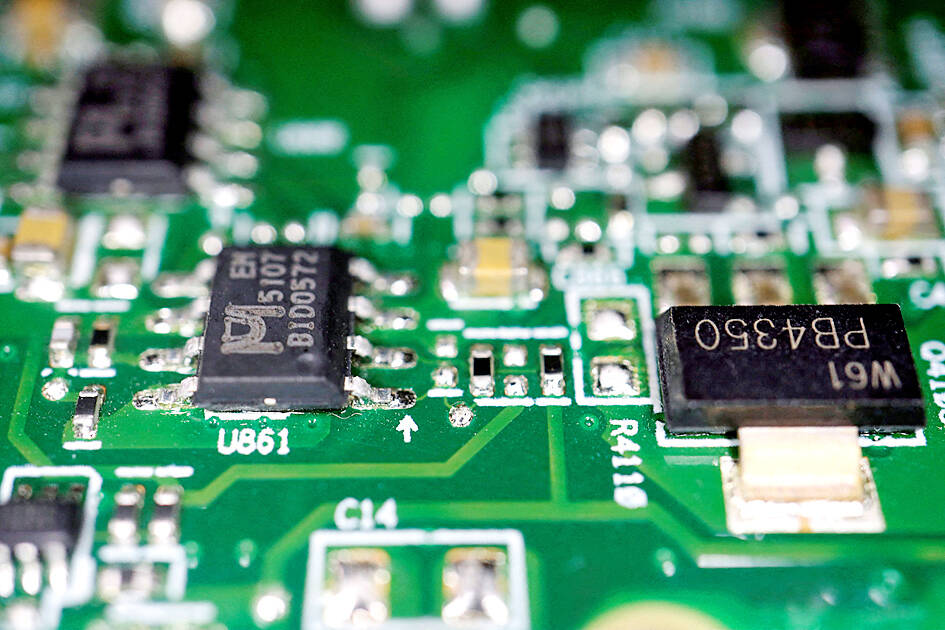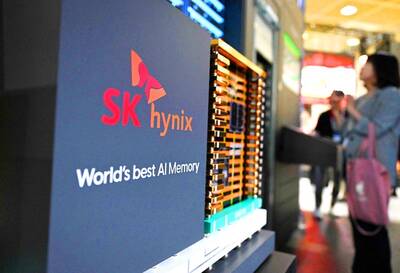US President Joe Biden’s administration yesterday said it plans to halt shipments to China of more advanced artificial intelligence (AI) chips designed by Nvidia Corp and others, part of a suite of measures aimed at stopping Beijing from getting cutting-edge US technologies to strengthen its military.
The rules restrict a broader swathe of advanced chips and chipmaking tools to a greater number of countries including Iran and Russia, and blacklist Chinese chip designers Moore Threads Technology Co (摩爾線程) and Biren Intelligent Technology (壁仞科技).
The two Chinese start-ups were founded by former Nvidia employees in China and aim to compete with the US AI chip giant.

Photo: Reuters
The new measures aim to hamper China’s military development by closing loopholes in regulations released in October last year and will probably be updated “at least annually,” according to US Secretary of Commerce Gina Raimondo.
The goal is to limit China’s access to “advanced semiconductors that could fuel breakthroughs in artificial intelligence and sophisticated computers that are critical to (Chinese) military applications,” she said, stressing the administration was not seeking to hurt Beijing economically.
Nvidia has made chips such as the A800 and H800 that walked right up the line of the previous rules to continue selling to China, and Advanced Micro Devices Inc (AMD), also impacted by the rules, has said it plans a similar strategy.
The A800 and H800 chips will be hit by the new regulations, due to a change in chip parameters aimed at capturing a greater number of chips.
Nvidia warned that the new rules could hinder product development and cause other difficulties, though the changes aren’t likely to take a financial toll in the short term.
In a regulatory filing later in the day, Nvidia said that the restrictions “may impact the company’s ability to complete development of products in a timely manner, support existing customers of covered products, or supply customers of covered products outside the impacted regions.”
The rules may even "require the company to transition certain operations out of one or more of the identified countries," it added.
The rules will exempt most consumer chips used in laptops, smartphones and gaming, though some will be subject to licensing and notification requirements by US officials.
“The fact is, China, even after the update of this rule, will import hundreds of billions of dollars of semiconductors from the United States,” Raimondo said, emphasizing that the goal of the measures was not to hammer US companies.
The previous rules imposed a two-pronged test that measured both a chip’s computing performance and its ability to communicate with other chips, an important measure in AI supercomputers where thousands of chips are strung together to chew through huge amounts of data.
Nvidia and Intel Corp created special chips for the Chinese market that retained powerful computing capabilities but limited communications speeds to stay inside the previous rules.
The rules released yesterday eliminate the communication speed limits and focus on computing performance, which will have the effect of halting sales of Nvidia’s A800 and H800 chips for the Chinese market, according to a senior administration official.
US officials yesterday added a new measure to restrict chips that exceed a certain level of “performance density,” a measure focused on how much computing power can be packed into a given amount of silicon, a senior administration official said.
The official said this rule was meant to prevent companies from trying to work around restrictions on full chips by using a technology called “chiplets,” where firms could try to join together small pieces called chiplets into a large chip that violates the rules.
Reuters reported in July that chiplets have become a core part of China’s technology strategy to advance its chip industry, and analysts have said that Chinese companies could use the technology to evade US restrictions.
The new measures also expand licensing requirements for exports of advanced chips to more than 40 additional countries that present risks of diversion to China and are subject to US arms embargoes, the officials said.
That measure appears to build on a letter received by Nvidia in August that it described as restricting shipments of its A100 and H100 chips beyond China to other regions including some countries in the Middle East.
Confirming a Reuters report, chips will be barred from being sent to units of firms located anywhere in the world if their parent companies are headquartered in China, Macau and other arms embargoed countries. The move is part of a bid to keep the chips from being illegally smuggled into China or remotely accessed by Chinese parent companies.
The Biden administration also hit 21 countries outside China with a licensing requirement for chipmaking tools and broadened the list of equipment barred from going to that country.

Intel Corp chief executive officer Lip-Bu Tan (陳立武) is expected to meet with Taiwanese suppliers next month in conjunction with the opening of the Computex Taipei trade show, supply chain sources said on Monday. The visit, the first for Tan to Taiwan since assuming his new post last month, would be aimed at enhancing Intel’s ties with suppliers in Taiwan as he attempts to help turn around the struggling US chipmaker, the sources said. Tan is to hold a banquet to celebrate Intel’s 40-year presence in Taiwan before Computex opens on May 20 and invite dozens of Taiwanese suppliers to exchange views

Application-specific integrated circuit designer Faraday Technology Corp (智原) yesterday said that although revenue this quarter would decline 30 percent from last quarter, it retained its full-year forecast of revenue growth of 100 percent. The company attributed the quarterly drop to a slowdown in customers’ production of chips using Faraday’s advanced packaging technology. The company is still confident about its revenue growth this year, given its strong “design-win” — or the projects it won to help customers design their chips, Faraday president Steve Wang (王國雍) told an online earnings conference. “The design-win this year is better than we expected. We believe we will win

Power supply and electronic components maker Delta Electronics Inc (台達電) yesterday said it plans to ship its new 1 megawatt charging systems for electric trucks and buses in the first half of next year at the earliest. The new charging piles, which deliver up to 1 megawatt of charging power, are designed for heavy-duty electric vehicles, and support a maximum current of 1,500 amperes and output of 1,250 volts, Delta said in a news release. “If everything goes smoothly, we could begin shipping those new charging systems as early as in the first half of next year,” a company official said. The new

SK Hynix Inc warned of increased volatility in the second half of this year despite resilient demand for artificial intelligence (AI) memory chips from big tech providers, reflecting the uncertainty surrounding US tariffs. The company reported a better-than-projected 158 percent jump in March-quarter operating income, propelled in part by stockpiling ahead of US President Donald Trump’s tariffs. SK Hynix stuck with a forecast for a doubling in demand for the high-bandwidth memory (HBM) essential to Nvidia Corp’s AI accelerators, which in turn drive giant data centers built by the likes of Microsoft Corp and Amazon.com Inc. That SK Hynix is maintaining its